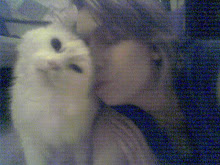Freaky Insight into Training Seminar Incident
I just realized something strange about an incident that occurred during the training seminar. We had to partner up with others to present one section of the training using information that was given to us (like a jigsaw classroom). Our section was on the way nonverbal communication affects others. So we did role playing in which I was the principal and my partner was the student who was being reprimanded. In one scenario, the student rolls her eyes, crosses her arms, and looks away, indicating defiance. In the other scenario, the student looks directly at the principal, arms to the side, head nodding, indicating she's willing to listen. The rest of the groups had specific issues with the scenarios because they thought the second scenario would only indicate the student was playing the principal for a fool and just trying to get away with the behavior. Then another person said he would feel more comfortable if the student had slouched and held eyes downward, indicating remorse and submissiveness.
First, I'm a little taken aback that the other people would make such immediate and negative assumptions about students' motivations for behavior. We should be able to give students the benefit of the doubt and not emotionally respond to students ourselves before taking the information from both sides into consideration. Second, the preference for a submissive student also disturbs me. The whole premise of the program is to get people to stop reacting to their emotions, and begin utilizing higher level reasoning in response to situations. A submissive student is operating on fear of punishment, not rationality. The student we had depicted in the second scenario had obtained control of her emotions and was ready to listen and rationally discuss the incident. I think the reason the adults were so unwilling to consider that scenario was that they typically create situations in which guilt is immediately assumed, and students are not treated with enough respect to allow them give their side of the story or at least try to reason with the adult on a relatively equal playing field. Instead, they remain in the seat of power, and students' only recourse is to act defiantly or submissively. I'm sure the adults would benefit from this program themselves if only they realized that their response operated on emotions rather than rationality as well.




1 Comments:
This is very insightful and something I have discovered in my own parenting style more often than I like to admit. I often assume the first accusers or complainers are in the right and the accused is wrong. Many of our discussions are emotional and end in the same result, no one heard the other person. One thing I have found helpful is to assure the child I want to hear them out and I want to be able to have them listen to me. I try to remind them of all perspectives in the situation, maybe the other child making the complaint or other adult making the accusation, and repeat back their view so they knew I heard them (trust it's the truth but have them help you determine how to resolve the situation including all perspectives). Once they feel heard, I try to make sure they understand the scenario from both their side of story, their side if they are lying (I am not shy to point out any inconsistsencies in their story and why it may appear they are lying if I think they are), and the other perspectives and then make a plan with them to be accountable either for what they did or what others think they did and how they can do the right thing from here.
What is the body language of "past the emotions" both parties are listening to each other?
Post a Comment
<< Home